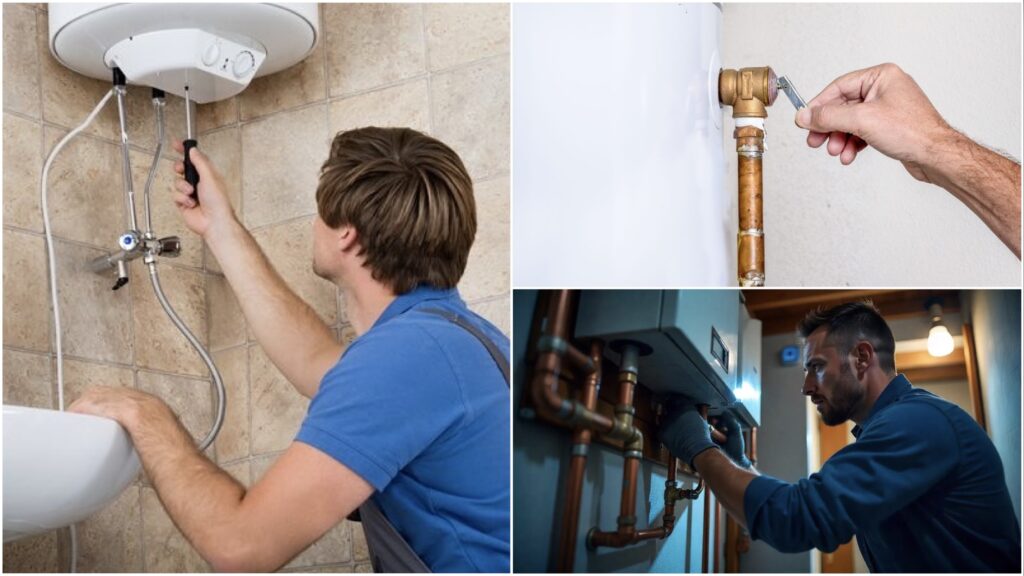It’s a frosty morning, and halfway through your shower, the water suddenly turns ice-cold. Everyone’s scrambling, teeth chattering, and blaming the weather, except that it’s not the weather. It’s a neglected water heater crying out for attention.
Truth is, hot water heater maintenance isn’t glamorous, but it keeps life running smoothly. A little TLC now saves you from nasty surprises later. Let’s teach you how to maintain your water heater in a few minutes.
Hot water systems are not complicated to care for once you know the basics.
Hot Water Heater Maintenance 101
Before the steps, let’s talk a little about the importance of hot water heater maintenance. Your heater is one of the unsung heroes of your house, working nonstop. Over months and years, it builds up sediment, seals get tired, and tiny leaks creep in like uninvited guests.
Learn the basics and you’ll spot trouble early, which is half the battle. Also, take note of whether the unit is electric or a gas tankless water heater; the way you care for each is slightly different, and that little detail saves time and guesswork down the road.
Simple Water Heater Care Tips Every Homeowner Can Use
Hot water systems are not complicated to care for once you know the basics. Set the thermostat to around 120°F. Not only is that kinder to your skin. It saves energy and helps the tank last longer.
Next, check the insulation around the tank and pipes; a cheap pipe wrap can cut heat loss and stop the heater from working overtime. These water heater care tips aren’t glamorous, but they’re low-effort wins that add up. Do them now, and you’ll thank yourself when the bills are lower and the showers stay hot.
Inspecting the Pressure Relief Valve for Safety
The pressure relief valve is a small but critical component that protects your home from potential hazards. Don’t ignore it. It’s tiny and easy to forget, yet it prevents dangerous pressure buildup.
Test it by lifting the lever; you should see a quick trickle of water. If nothing happens or the valve keeps dripping afterward, replace it. This is one of those hot water heater troubleshooting checks that’s quick to do and could stop a nasty surprise.
Flushing Sediment
Over time, minerals in the water settle at the tank’s bottom and act like a blanket, making the heater work harder. Once a year, hook a hose to the drain valve and run it until the water runs clear. That’s called flushing, and it’s the secret sauce for extending a tank’s life. No rocket science here, just patience and a hose.
Leak Detection
Leaks start small, usually as a barely noticeable damp patch. Inspect the base of the tank, fittings, and pipes. Even tiny drips can lead to mold or ruin a floor if left alone. If you spot one, give it attention fast. Many times, early leak detection can keep issues from turning into expensive repairs or the silent dangers lurking in your home.
A neglected heater can quietly cause humidity, which invites mold and other nasty stuff.
Hot Water Heater Troubleshooting Made Simple
If the water’s not hot enough, the thermostat might be set low—or an element could be failing on electric models. Strange noises? Banging usually points to sediment.
For gas units, glance at the pilot light; for electric ones, check the heating elements. You don’t need to be a pro to do these basic checks. If something smells weird, or you’re unsure, call a licensed technician—no heroics with gas or electrical parts.
Cleaning Tips to Improve Efficiency
Keeping the area around the heater tidy helps with airflow and cuts down on dust that could clog the unit. Wipe the tank periodically, vacuum vents nearby, and descale tankless models when minerals start to accumulate. It’s the kind of spring-cleaning nobody loves, but your heater will run better for it.
Preventing Hidden Household Hazards
A neglected heater can quietly cause humidity, which invites mold and other nasty stuff. Fix leaks promptly and utilize simple methods to reduce indoor humidity, such as using vent fans, dehumidifiers, or opening a window while cooking. These small moves protect your home’s structure and your family’s health.
A Reliable Hot Water Heater Starts with You
Caring for your water heater doesn’t have to be a massive chore.
Check the pressure relief valve, flush sediment yearly, watch for leaks, and keep the area clean; that’s your maintenance starter pack.
Doing all these to maintain your hot water heater doesn’t just extend the lifespan but also saves you money. Furthermore, it will save you from having cold surprise showers.
Ready to get it done? Grab a calendar, block a morning, and give your heater a once-over.
Try one of these steps today and see how much smoother things run.
